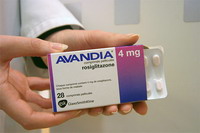Drug Avandia proved to have no connection with increased number of deaths
An anti-diabetic drug Avandia, marketed by the pharmaceutical company GlaxoSmithKline, was proved to have no connection with the increased number of deaths among diabetics.

The profound study showed that the cause of deaths was sudden drops of significant value in patient's blood sugar, but not the drug itself.
Avandia or Rosiglitazone first attracted public attention in 2007 when Dr. Steven Nissen and his colleague Kathy Wolski published an article in the issue of The New England Journal of Medicine (June 14, 2007). The experts reported that the use of rosiglitazone was associated with a slightly increased risk of heart attack (20% more likely, odds ratio=1.43). The FDA issued an alert on May 21, 2007.
On July 30, 2007 an Advisory Committee of the Food and Drug Administration concluded that the use of rosiglitazone for the treatment of type 2 diabetes was associated with a greater risk of "myocardial ischemic events" (including heart attacks) than a placebo, metformin, or sulfonylurea. The FDA Advisory Committee recommended that label warnings and educational efforts to this effect be instituted immediately. An article by the committee chairman, Dr. Clifford J. Rosen, called "The Rosiglitazone Story - Lessons from an FDA Advisory Committee Meeting" appeared in the August 30, 2007 issue of The New England Journal of Medicine.
Pioglitazone, the other thiazolidinedione on the market, was found not to have the same risks as rosiglitazone. Indeed, a study sponsored by its manufacturerTakeda Pharmaceutical Co. found that it reduces the risk of heart attack, stroke and death, but - like rosiglitazone - increases the risk of heart failure.
Photo: www.steadyhealth.com
Subscribe to Pravda.Ru Telegram channel, Facebook, RSS!




